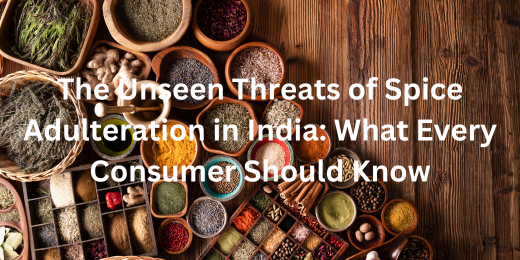
The Unseen Threats of Spice Adulteration in India: What Every Consumer Should Know
Health risks of adulterated spices
The Spice Adulteration Problem in India
Spice adulteration has become a serious issue in India, impacting both consumer safety and product quality. The widespread problem has led to an increase in cases of contamination in common spices. Health risks of adulterated spices include long-term damage to vital organs, leading to significant health concerns for consumers.
Common adulterants in spices include harmful substances such as synthetic dyes, starch, and chemicals like lead chromate. These dangerous chemicals are often added to increase weight and enhance the colour of spices. Turmeric adulteration is particularly problematic, as it affects a spice heavily relied upon for both culinary and medicinal uses.
Regulatory bodies face numerous challenges when attempting to tackle the growing issue of spice adulteration. The decentralised trade system makes it difficult to enforce strict regulations across all regions effectively. Encouraging consumers to purchase from an organic store helps mitigate these issues by supporting the availability of organic food products.
Turmeric: A Prime Target for Adulteration
Turmeric plays a vital role in Indian cuisine and traditional medicine, offering numerous health benefits. It is often praised for its anti-inflammatory and antioxidant properties, used in both food and remedies. Unfortunately, turmeric adulteration threatens these benefits, as contaminated turmeric undermines its nutritional and medicinal value, harming consumers.
Adulterants found in turmeric often include harmful substances such as lead chromate, which enhances the yellow colour. Chalk powder or starch is occasionally mixed into turmeric to enhance its volume, compromising the quality and authenticity of the spice in the process. Spice adulteration negatively impacts the quality of the product, posing serious health risks for unsuspecting consumers.
Simple tests can help identify adulterated turmeric, protecting consumer safety and well-being. One method involves mixing turmeric with water to check for unnatural residues. Buying from an organic store also ensures a safer product, as organic food products adhere to strict quality standards and regulations.
Adulteration in Spices: A Growing Concern
The issue of spice adulteration is a serious concern for consumers. Many adulterants, such as synthetic dyes, can be harmful to health. These substances may contain heavy metals like lead and arsenic, posing significant long-term health risks to those who consume them regularly.
The presence of pesticides in spices poses an additional concern for consumer health and food safety standards. Pesticides can enter the spice supply chain due to improper farming practices and lack of regulations. Consuming spices with high pesticide residues can lead to various health issues, raising concerns among consumers about their safety.
Many individuals are increasingly choosing organic food products to promote better health and enhance overall well-being. Purchasing spices from an organic store can help minimise the risk of exposure to harmful substances. Choosing organic options supports healthier eating and promotes safer agricultural practices, benefiting both consumers and the environment.
Citizen-Led Testing: A Step Towards Transparency
Citizen-led testing has emerged as a vital step towards transparency in the food industry. Concerned individuals collected turmeric samples from various markets to check for contamination. This random sampling approach aims to highlight the issues of spice adulteration and encourage better practices in food safety.
The tests revealed significant consequences correlated to aflatoxin contamination levels present in turmeric samples. Aflatoxin contamination arises from particular fungi that prosper in warm and humid conditions typically found in India. These fungi can produce harmful aflatoxins that pose serious health risks of adulterated spices, affecting consumers’ well-being over time.
To combat these issues, many consumers are turning to organic food products. Choosing turmeric from an organic store can help reduce the risk of contamination. Organic options often undergo stricter quality controls, ensuring that consumers receive safer and healthier food choices that support their health and wellness goals.
Preventing Aflatoxin Contamination in Turmeric
Contamination by aflatoxin in turmeric can happen at multiple stages throughout the production process, affecting quality. In the pre-harvest stage, fungi may infect turmeric plants, leading to contamination. Factors such as high temperatures, humidity, and poor soil quality contribute to turmeric adulteration, significantly impacting the quality of the final product.
Post-harvest processes also play a crucial role in contamination risks. During processing and storage, improper handling can lead to the spread of aflatoxin. Non-segregation of contaminated turmeric rhizomes can further increase the health risks of adulterated spices, highlighting the need for careful agricultural practices.
Preventive measures can effectively minimise aflatoxin contamination. Implementing proper irrigation and drainage systems helps maintain appropriate soil moisture levels. Additionally, storing turmeric in a cold storage with controlled conditions can significantly reduce the risk of contamination, ensuring consumers receive safe and healthy products. In Uyir organic farmers market, we use cold storage to prevent the aflatoxin contamination.
The Road Ahead: A Collaborative Approach
The fight against spice adulteration requires collaborative efforts from various stakeholders. Government authorities must implement stringent checks throughout the production and distribution processes. By enforcing these regulations, consumer safety can be significantly improved, ensuring that spices remain safe and authentic for everyone.
Spice traders have a vital role in adopting modern technologies. Machine sorting and testing for contaminants can enhance quality control in the spice supply chain. These measures will help reduce the health risks of adulterated spices, ultimately benefiting both traders and consumers alike.
Consumer education is essential in this battle against adulteration. Individuals should understand the importance of selecting safe organic food products and recognising potential risks. Increased awareness allows consumers to make informed choices, supporting the integrity of the spice industry while promoting safety in their kitchens.
For the finest selection of organic turmeric powder, alongside a variety of organic spices and other food products and organic fertilisers, visit your nearest Uyir Organic Farmers Market or conveniently shop online at www.uyironline.in or www.uyirorganic.farm.
This blog post is based on the information provided in the article from swarajyamag.com.